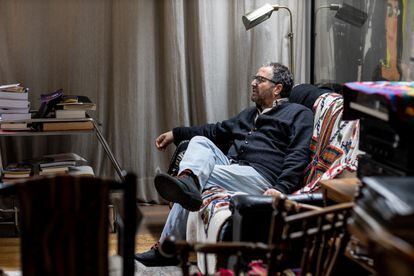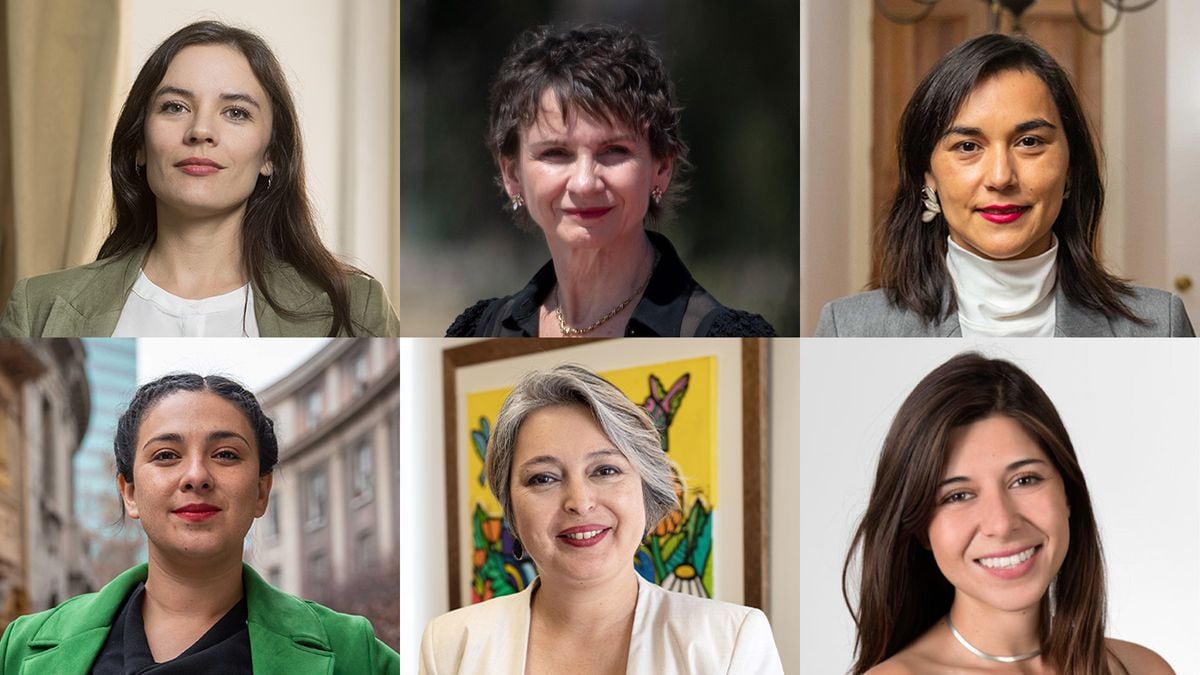The writer and journalist Patricio Fernández (Santiago, 52 years old), was one of the 154 conventionalists who for a year drafted the Chilean constitutional proposal that will be plebiscitated on September 4.
Elected as an independent he quickly joined the Socialist Collective.
He defines himself as a "moderate par excellence."
From the living room of his house in Providencia, invaded by hundreds of books, he assures that he immersed himself in the process out of curiosity, but that within the Convention rage prevailed more.
A supporter of approving the text and burying the Constitution inherited from the Pinochet dictatorship, he insists that this rage was not imposed in the regulations and that "the experts were the ones who were in the most questioned parts."
Fernández will participate this Thursday in the seminar
Let's talk about the Constitution
, organized by the independent study center Espacio Público, of which Fernández is director.
Ask.
The right split in the plebiscite on whether or not to draft a new Constitution.
Now it is the center-left that is divided on whether or not to approve the proposal.
To what do you attribute it?
Response.
A center-left group has dissociated itself, but all its parties are for
Approval
.
I think there are worlds that are more nostalgic with the past and resentful of the new generations.
There is a part that has found it harder to surrender to the next step of political evolution and see how to collaborate with it, instead of facing this new generation -just as it faced them-.
Also because in this project there are issues in dispute, possible debates.
The result of the initial plebiscite [80% approved changing the Constitution] invited us to dream of leaving there all dancing and hugging each other.
It was a conflictive, complex, rough meeting, with independents, with 40% of its members under 40 years of age, with half of them women, with native peoples, with political inexperience, with combat causes.
I have the impression that some [of the center left] believe that they are loved now.
P.
According to the surveys they are not alone.
There are many who voted to change the Constitution and now they are going for the rejection.
What did these people want to find that is not in the text?
R.
They found conventional that they did not like.
With a tone, with an inexperience, with an informality that for many was not consistent with the importance of the moment.
They did not find the final solution in the process.
I believe that the final solution is found in the text.
The great pillars, beyond the details that have to be repaired, are: parity democracy;
ecological theme;
deconcentration of power;
recognition of cultural diversity, very embodied in the concept of a plurinational state;
and the passage from the subsidiary state to the social state of law.
Does that mean it's ready?
No. The process continues, but it does establish the great axes of transformation that are unavoidable.
P.
Why do you think that of these five axes the criticism has focused on indigenous issues?
R.
One reason, which I understand, has to do with the fact that the borders of plurinationality are not drawn and, therefore, the possibility of seeing ghosts arise is high.
What do I mean?
If there is going to be legal pluralism, and someone imagines that with this the indigenous people are going to have a completely different universe of laws, that if someone enters into a conflict with an indigenous person, a
lonko
is going to judge him and he is going to privilege the indigenous person, etc. it is understandable that they have terrors.
But legal pluralism is about to be drawn in the parliamentary discussion.
It could end up reduced to family trouble or egg theft.
Details in the refrigerator of the house of Patricio Fernández. sofia yanjari
P.
Or it could include criminal, administrative issues...
R.
But we have a Senate where half of its members are from the right and a Chamber of Deputies where they are 43%, and those people are elected by Chileans.
If someone believes that the constituted powers are nefarious and a gang of criminals that at the slightest chance are going to leave the big one, well, yes, let them be terrified.
But I would have to tell him to be terrified for many more reasons than multinationality.
It means that we are in the hands of Ali Baba and his thieves.
It is also undeniable that in Chile it is difficult for us to recognize the value of differences.
We also forget in reality that we are, mainly with the Mapuche people.
We have reached very, very serious levels of violence and rupture.
All this under the wing of a Constitution that does not recognize the existence of indigenous peoples.
P.
The right criticizes that they were marginalized from the process
R.
It is true that very few proposals from the right passed forward.
It is not true that they did not participate in the final result, because many regulations would not have passed without their approval.
Having said that, I believe that one of the great errors of the Convention was not having opened the possibility of dialogue with some sectors of the right that arrived with a good disposition.
That closure came, in part, from grudges, stories of prostration that blamed those who had been in power.
On the other hand, there were worlds in the Broad Front and in the Socialist Collective that were slow to discover their responsibility when leading a tone and for a long time they succumbed to this vindictive force before which they did not want to stand as a counterpart, but as an ally.
P.
Is it one of those that you approve of dryly or to reform?
R.
Of those who approve as part of a process that does not have to stop and which is missing stages.
What has been done by the Convention has multiple areas of improvement.
Interestingly, the greatest number belong to the spaces where the specialists worked the most: the political system, which was like the Union Club, where the constitutionalists, the lawyers, the politicians were.
And the justice system, which was more or less similar.
When it is thought that experts were missing, the experts were the ones who were in the most questioned parts.
Pinochet's Constitution ended up being the Constitution of the transition and satisfying some who were persecuted by the dictatorship.
If that cycle could have had that immense evolution, imagine what awaits this Constitution born of a democratic agreement in times of change.
P.
Within the Approval there is a division between those who want to fix the reforms before and those who want to do it after the plebiscite. Do you think you can add more supporters to do it before?
R.
I think it's a good idea.
I think it is very clear that there is a battery of reforms that have been fairly agreed upon and I am also in line, not only with different groups from the center left, but also with the President of the Republic, who has just said that he not only wants it, but that he urges
Majorities to make improvements to this constitutional proposal are.
P.
You say that there is agreement on the reforms, but there is a month to go before the plebiscite and there is no written and detailed commitment
R.
The problem for this to materialize is that there will be certain differences within Approve Dignity [formed mainly by Boric's Broad Front and the Communist Party].
In democratic socialism there is enough alignment.
Now, with President Boric expressing himself with that clarity, I suppose that he will activate the search for some of these points and I hope that we will arrive at a proposal so that the voters know that if I vote I approve, there is already a fixed commitment with certain transformations.
Patricio Fernández in his studio in Santiago de Chile.
sophia yanjari
P.
How much does the result of the plebiscite affect the Boric Government?
How much does rejection harm him and how much does approval benefit him?
R. For the Government of Boric a triumph of the
Rejection
is very complicated
.
First, because the president is one of the fundamental creators of this process.
It is possible that without Boric, the peace agreement and the new Constitution would not have flowed.
Second, because the Government has committed itself, there is a new political cycle, the arrival of a new generation, it is all very much part of the same story.
They are very difficult to dissociate.
I think Boric shed light when he proposed that if he won the rejection, the process had to be resumed, because deep down what he said was: beyond the result, the good ending of this process is my responsibility too.
In that sense, if he has the ability to carry it through, the triumph of
Rejection
It would not have to be the defeat of the process, but it would be hard.
P.
The constituent process began as a result of a social fracture embodied in the outbreak.
How do you see that fracture today?
R.
Better than July 4, 2021. If we realized something in the outbreak and the Convention, it is that there are wounds here, grudges, which are very big.
Some come from the dictatorship, others from social experiences, from cultural discrimination.
Many spoke on behalf of their parents, first generation university students who still have their family's history of prostration, many women with stories of contempt.
Why do I think we are better off?
Because they expressed themselves.
Sweetly, like a choir?
No. They expressed themselves with anger, pain, resentment.
But after this, those voices are part of this new stage.
P.
Is it a plebiscite on the credibility of the right versus the left?
R.
I think that to a large extent it has become that.
Who do you believe?
Subscribe here to the EL PAÍS América newsletter and receive all the key information on current affairs in the region








/cloudfront-eu-central-1.images.arcpublishing.com/prisa/EVO3ONJQQIMWO4H4NLQHLOCP4Y.jpg)
